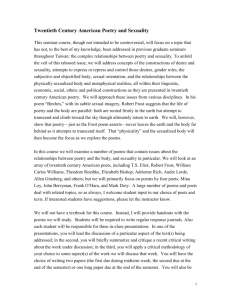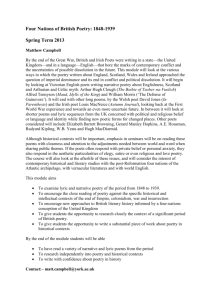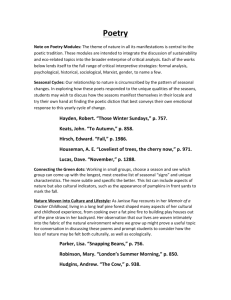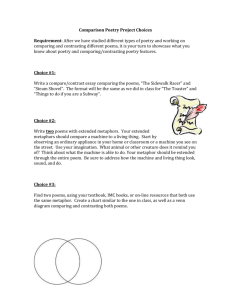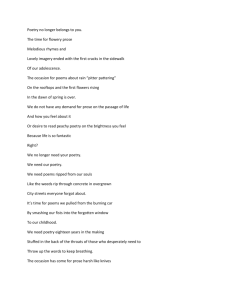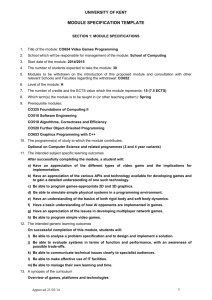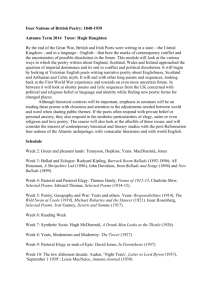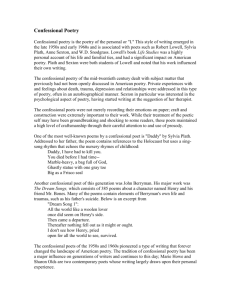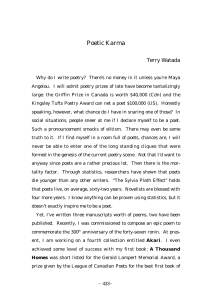University of Kent at Canterbury
advertisement
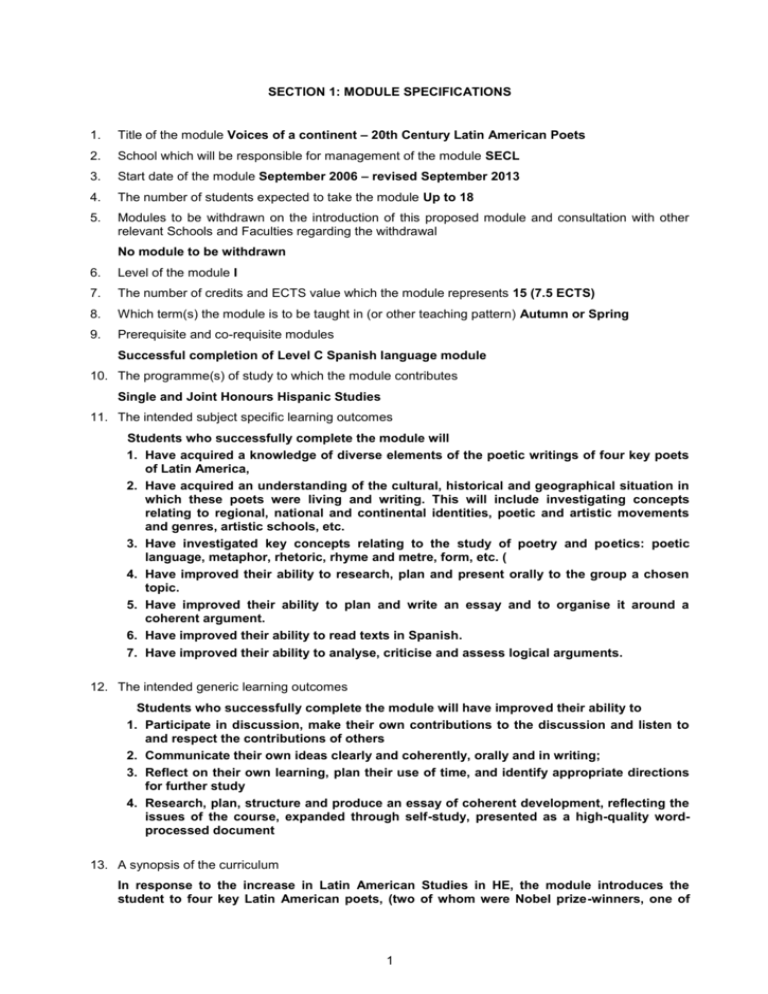
SECTION 1: MODULE SPECIFICATIONS 1. Title of the module Voices of a continent – 20th Century Latin American Poets 2. School which will be responsible for management of the module SECL 3. Start date of the module September 2006 – revised September 2013 4. The number of students expected to take the module Up to 18 5. Modules to be withdrawn on the introduction of this proposed module and consultation with other relevant Schools and Faculties regarding the withdrawal No module to be withdrawn 6. Level of the module I 7. The number of credits and ECTS value which the module represents 15 (7.5 ECTS) 8. Which term(s) the module is to be taught in (or other teaching pattern) Autumn or Spring 9. Prerequisite and co-requisite modules Successful completion of Level C Spanish language module 10. The programme(s) of study to which the module contributes Single and Joint Honours Hispanic Studies 11. The intended subject specific learning outcomes Students who successfully complete the module will 1. Have acquired a knowledge of diverse elements of the poetic writings of four key poets of Latin America, 2. Have acquired an understanding of the cultural, historical and geographical situation in which these poets were living and writing. This will include investigating concepts relating to regional, national and continental identities, poetic and artistic movements and genres, artistic schools, etc. 3. Have investigated key concepts relating to the study of poetry and poetics: poetic language, metaphor, rhetoric, rhyme and metre, form, etc. ( 4. Have improved their ability to research, plan and present orally to the group a chosen topic. 5. Have improved their ability to plan and write an essay and to organise it around a coherent argument. 6. Have improved their ability to read texts in Spanish. 7. Have improved their ability to analyse, criticise and assess logical arguments. 12. The intended generic learning outcomes Students who successfully complete the module will have improved their ability to 1. Participate in discussion, make their own contributions to the discussion and listen to and respect the contributions of others 2. Communicate their own ideas clearly and coherently, orally and in writing; 3. Reflect on their own learning, plan their use of time, and identify appropriate directions for further study 4. Research, plan, structure and produce an essay of coherent development, reflecting the issues of the course, expanded through self-study, presented as a high-quality wordprocessed document 13. A synopsis of the curriculum In response to the increase in Latin American Studies in HE, the module introduces the student to four key Latin American poets, (two of whom were Nobel prize-winners, one of 1 whom is contemporary), representing different periods and different approaches to poetry. The course takes account of the relationships between poetry and the social, political and cultural context from which it emerges, while also allowing for discussion of particular critical and aesthetic issues relevant to poetry. Topics covered would include ultraísmo and the avant-garde, politically committed poetry, gender issues, negrismo, mulatismo, the particularities in the use of style and rhyme in Spanish verse, and the critical terms used in the discussion of poetry, both in Spanish and English. 14. Indicative Reading List Pablo Neruda – Selected Poems (Penguin 20th Century Classics, ed. Nathaniel Tarn, intro Jean Franco) Jorge Luis Borges – Selected Poems (Penguin Modern Classics, ed. Alexander Coleman, 2000) Jorge Luis Borges – Antología poética 1923-1977 (Alianza Editorial, 1999) Nancy Morejón – Black Woman and other poems / mujer negra y otros poemas (trans. Jean Andrews, Mango Publishing, 2004). 15. Learning and Teaching Methods, including the nature and number of contact hours and the total study hours which will be expected of students, and how these relate to achievement of the intended learning outcomes 20 contact hours over 10 weeks, consisting of a weekly one-hour lecture and a weekly onehour seminar. Total Contact Hours: 20 Total Study Hours: 150 Lectures and seminars will be conducted in English. The lecture will be predominantly lecturer-led, comprising a short introductory presentation which will set out the key ideas and themes for the week, and will provide basic information about the relevant texts and a framework in which to understand them. The seminars will be more student-led, involving individual and group presentations, group discussions, debates etc. Questions for discussion will be posed, both about the interpretation of the texts and about the wider questions which they raise, and students will be encouraged to develop their own views about these questions. The alternation of small-group and large-group discussion will give students confidence to formulate their own ideas and to share them with a larger group. Students will use Web resources and PowerPoint application to reinforce their IT skills, research capabilities and oral presentation technique. These learning and teaching methods will satisfy Learning Outcomes 11.1-7 and 12.1-4 16. Assessment methods and how these relate to testing achievement of the intended learning outcomes The assessment will be 100% coursework. This will comprise: Essay 2,000 – 2,500 words (45%) Mid-term assignment (45%) Seminar performance (10%) The written work will test the achievement of subject-specific learning outcomes 11.1-7 and generic learning outcomes 12.2-4. Seminar performance will also test all these and, in addition, generic learning outcome 12.1. 2 17. Implications for learning resources, including staff, library, IT and space All the material not collated in a course booklet is either already available in Templeman Library or shall be purchased with this year’s allocation. 18. The School recognises and has embedded the expectations of current disability equality legislation, and supports students with a declared disability or special educational need in its teaching. Within this module we will make reasonable adjustments wherever necessary, including additional or substitute materials, teaching modes or assessment methods for students who have declared and discussed their learning support needs. Arrangements for students with declared disabilities will be made on an individual basis, in consultation with the University’s disability/dyslexia support service, and specialist support will be provided where needed. 19. Campus(es) where module will be delivered: Canterbury SECTION 2: MODULE IS PART OF A PROGRAMME OF STUDY IN A UNIVERSITY SCHOOL Statement by the School Director of Learning and Teaching/School Director of Graduate Studies (as appropriate): "I confirm I have been consulted on the above module proposal and have given advice on the correct procedures and required content of module proposals" ................................................................ .............................................. Director of Learning and Teaching/Director of Graduate Studies (delete as applicable) Date ………………………………………………… Print Name Statement by the Head of School: "I confirm that the School has approved the introduction of the module and, where the module is proposed by School staff, will be responsible for its resourcing" ................................................................. .............................................. Head of School Date ……………………………………………………. Print Name SECTION 3: MODULE IS PART OF A PROGRAMME IN A PARTNER COLLEGE OR VALIDATED INSTITUTION (Where the module is proposed by a Partner College/Validated Institution) Statement by the Nominated Officer of the College/Validated Institution (delete as applicable): "I confirm that the College/Validated Institution (delete as applicable) has approved the introduction of the module and will be responsible for its resourcing" 3 ................................................................. Nominated Responsible Officer College/Validated Institution of .............................................. Partner Date …………………………………………………. Print Name ………………………………………………….. Post …………………………………………. Partner College/Validated Institution Module Specification Template Last updated July 2010 4
